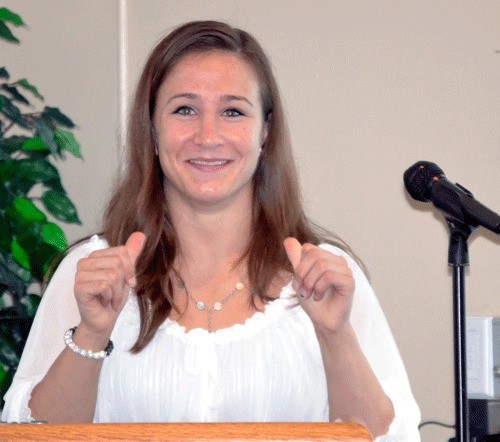At 26 years old, Marti Malloy has spent well over half her life chasing a dream — one that came true when she captured the bronze medal in judo at the London Olympics last month.
Malloy was the guest speaker Tuesday at the meeting of the Oak Harbor Area Council of the Navy League, where she shared a brief look at the last few months of what has essentially been her life’s journey and how it felt to win a medal.
“It’s pure emotion,” she said of her reaction when she realized she’d won. “It’s pure and utter joy, combined with a little disbelief.”
Early start
Malloy began her path to Olympic bronze when she was just 6 years old. It got serious after she turned 16 and began to win events. She eventually moved to San Jose, Calif., where she attended San Jose State University continuing to train and compete in judo. It was toward the end of 2011 at the judo World Championships, considered the highest level of competition in the sport, that Malloy’s dream of the 2012 Olympics drew closer.
“In the judo world, it’s the World Championships, the Olympics and the Paris Grand Slam,” Malloy said. After the competition, Malloy was ranked 16th in the world for her weight class. After the Paris Grand Slam, she was ranked 12th, which put her in good position to qualify for the U.S. Olympic team.
“It gave me a lot of points and moved me up into 12th,” she said, adding that the Paris crowd knows the sport well.
“It’s tough. They know judo, they understand judo, and they want the French to win,” she said, drawing a laugh from the crowd.
A shoulder injury following Paris kept Malloy off the mat for six weeks, a difficult place to be when there is no off-season in the sport in which you compete. But the rest helped and by Olympics time, Malloy was feeling good and excited to see the Olympic opening ceremony.
“But America goes last at the opening ceremonies, so the whole show was over by the time I got there,” she said. Her disappointment in missing the ceremony eased when she realized she was standing just 10 feet from the Olympic torch. But perhaps her biggest boost, besides winning bronze, was winning her first judo match against Telma Monteiro of Portugal, the number 2 seed going into the games.
Golden dream
“I want to say that was one of the upsets of these Olympics,” said Malloy. “I mean, for me, it was probably the worst possible draw for the first round. But if not for that first-round win, I wouldn’t have medaled.”
Put very simply, the goal in judo is to throw an opponent onto their back within a five minute match. Half points and quarter points can be awarded for partial throws. If there is no score at the end of the round, the match goes into overtime. If time runs out again, the three judges will pick the winner.
Malloy’s first-round went into overtime, where she earned a quarter point two minutes in to win the match.
In her second match, Malloy threw her opponent, Maris Yadinys of Columbia, in 40 seconds.
“An Olympic match should never be that short,” Malloy said. “But I was on a roll.”
Match three, against Russian Irina Zabludina, proved more difficult, even though Malloy had fought her previously and won. Twice Malloy threw her opponent, thinking she’d won the match, and twice the referee rescinded the call. With seven seconds to go, they were tied and it was up to the judges. They ruled in Malloy’s favor and it was on to the semifinals.
But there Malloy met her match. After dominating most of the match against Romania’s Corina Caprioriu, Malloy saw an opening for an attack.
“I lost, it sucks,” Malloy said, earning another laugh from the crowd. “It was a really bad feeling, knowing it was a risk I didn’t have to take.”
Bronze redemption
After a long day and four matches, Malloy had to fight again to win bronze.
“You have to refocus completely,” she said. “It was a long day, it was stressful. You’re tired, you’re hungry.”
But her coach, Jimmy Pedro, told her to keep fighting.
“He told me, ‘This feeling you have now is nothing compared to how bad you’ll feel if you don’t get up and fight this match,’” she said.
Pedro’s encouragement was all Malloy needed as she faced Giulia Quintavalle of Italy in the bronze medal round.
“It was a close match. Halfway through it I did a token move and knocked her flat on her back,” Malloy said with a grin. “I had the time of my life.”
Malloy said the best part of winning the bronze was being able to share her victory with her family.
“If I had won and my family wasn’t there, I would have been devastated. Those are the faces you’re used to seeing and those are the faces you most want to see,” she said. “I’m so grateful to everyone here for helping them to get there.”
Malloy will head back to San Jose, where she has applied for a master’s program. She’s also been in discussions with NBC television, but she’s been so busy since the Olympics, she can’t commit to anything. Well, anything except the Olympics.
“I will go for the 2016 Olympics,” she said.
Even after 20 years and a bronze medal, Marti Malloy will continue to chase her Olympic dreams.



